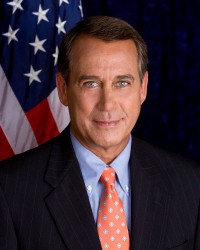Former House Speaker John Boehner joins Squire Patton Boggs

John Boehner, former speaker of the House. Official portrait.
Former Speaker of the House John Boehner, who led Republicans in the House of Representatives for almost nine years, has joined the law firm Squire Patton Boggs, according to a press release from that firm.
Boehner, who does not have a law degree, is not joining the law firm as a lobbyist, the press release says. Rather, his role will be “a strategic adviser to clients” with a focus on global business development. The Washington Post reports that “strategic adviser” is a common job title for former politicians who take jobs with lobbying organizations but don’t formally register as lobbyists. Squire Patton Boggs is the sixth-largest lobbying firm in the United States by revenue, the Post says.
The press release says Boehner brings former congressional aides John Criscuolo and Amy Lozupone with him to the firm; they join two other former Boehner employees, Natasha Hammond and Dave Schnittger. Also at Squire Patton Boggs, Politico says, are former Sens. Trett Lott (R-Mississippi) and and John Breaux (D-Louisiana) and former Rep. Jack Kingston (R-Georgia).
Boehner represented Ohio’s eighth district, just west of Dayton along the Indiana border, from 1991 until 2015. Politico notes that he’s joining a firm with other connections to Ohio; predecessor firm Squire Sanders was founded in Cleveland, and the father of Squire Patton Boggs chair Mark Reuhlmann was once mayor of Cincinnati.
The Washington Post says the news comes on the heels of an announcement last week that Boehner would join the board of tobacco company Reynolds American. Boehner smokes a Reynolds cigarette, the paper noted.
Boehner entered House Republican leadership early in his congressional career and became House Majority Leader in 2006, after the resignation of previous Majority Leader Tom DeLay because of a pending indictment. He was elected Speaker of the House in 2010. His time as speaker was marked by difficulties reconciling tea party Republicans with more moderate Republicans, Politico reported.



